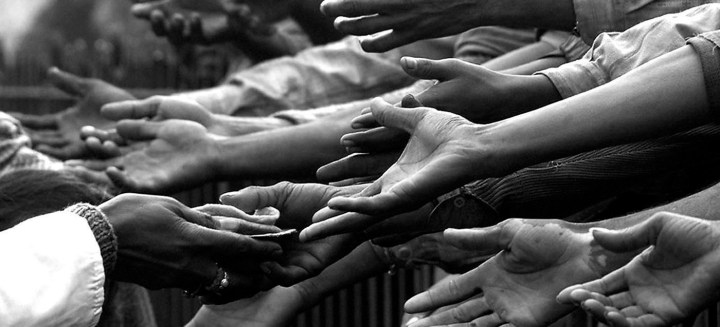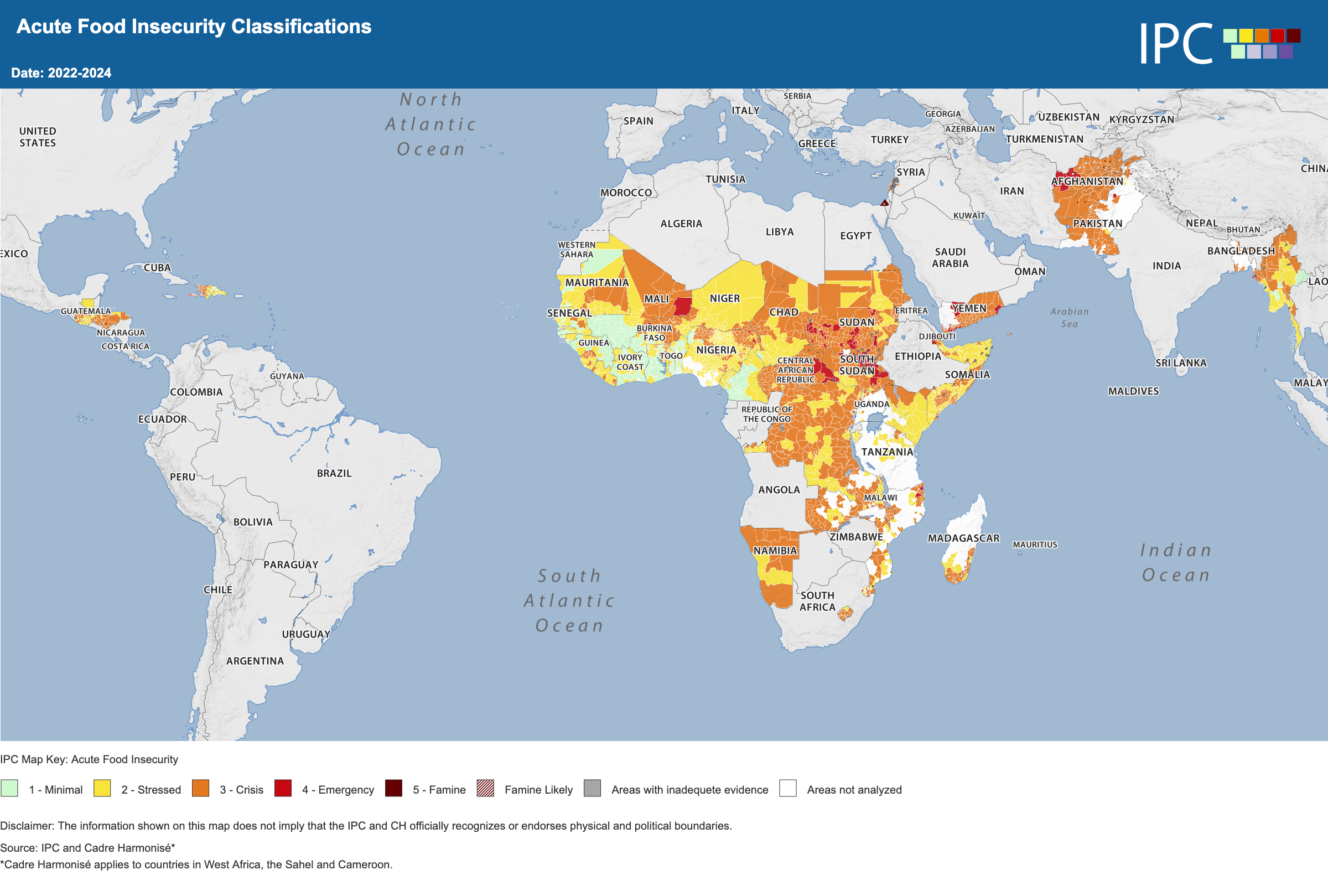ISS TODAY OP-ED
Hunger war games — weaponised starvation destroying countless African lives and communities

The use of starvation as a weapon of war is reversing decades of improvements in global hunger.
Modern conflicts are increasingly marked by the use of hunger as a weapon of war, and children are disproportionately affected. In Burkina Faso, Sudan, Ethiopia and the Democratic Republic of the Congo (DRC), conflict is driving emergency levels of hunger.
The crisis is exacerbated by the lacklustre response of both the African and international communities, characterised by underreporting, limited humanitarian aid and politicking in the multilateral system.
Improvements in agricultural production and humanitarian aid systems have reduced global hunger over the past two decades. But the international community’s treatment of Africa’s ‘forgotten’ wars highlights the double standards in how it approaches conflicts, and puts children’s lives at risk.
The use of starvation as a weapon is not unique to Africa. On 29 February, over 100 Palestinians were killed and 700 injured while attempting to get humanitarian relief parcels in Gaza. Two more attacks on aid seekers on 14 and 15 March killed dozens more.
Read more in Daily Maverick: Israel’s use of starvation as a weapon of war in Gaza
On 6 March, South Africa filed a request for additional provisional measures at the International Court of Justice (ICJ) and a modification of the court’s 26 January order in its ongoing case against Israel. South Africa’s application highlights the impending famine in Gaza due to Israel’s military siege. Children are dying of malnutrition, and starving Palestinians’ scramble for aid packages is their only lifeline.
Read more in Daily Maverick: South Africa asks ICJ to urgently act to prevent ‘full-scale famine’ in Gaza
After decades of consistently falling, a 2021 London School of Economics report attributes the resurgence in global hunger to war and transactional politics.
The United Nations’ (UN) Food and Agriculture Organization classifies acute food security according to five levels: 1 — minimal, 2 —stressed, 3 — crisis, 4 — emergency and 5 — catastrophe/famine. About 280 million Africans are facing some level of hunger, with at least five countries in level 4 emergencies. Gaza is facing a level 5 catastrophic famine; its decline in nutrition status is the fastest rate in history.
On 6 March, World Food Programme (WFP) Sudan spokesperson Leni Kinzli said Sudan’s people had been ‘forgotten’ – warning that 18 million people, including four million children, risked becoming the world’s biggest hunger crisis. Sudan is also the world’s largest displacement crisis, with 6.2 million internally displaced people and 1.8 million outside the country. Half are children.
Warring parties are accused of stealing supplies, blocking access to aid groups, looting trucks and attacking workers. The WFP called for immediate, unimpeded, safe access to conflict-affected areas to provide food. A cholera outbreak is compounding the food crisis, while only 20-30% of hospitals are functional across active conflict zones.
Unfolding crises
In Ethiopia, conflict and drought have left 20.1 million people urgently needing food assistance. Almost 400 have died from hunger this year alone. Tigray’s regional interim administration declared that 91% of its region was at risk of starvation and death.
In 2023, the WFP suspended food aid to Ethiopia following accusations of coordinated aid theft. In 2022, a UN panel accused Ethiopia’s government of using ‘starvation as a method of warfare’ in Tigray and obstructing access to food, humanitarian assistance, healthcare and essential services. Because of the conflict, only half of Tigray’s farmlands were active during the last planting season, with even lower yields.
Last September, the UN Children’s Fund labelled the DRC the ‘worst place in the world’ to be a child. In east DRC, a representative found a pair of acutely malnourished orphaned infant twins with explosive devices attached to their bodies as a booby trap. Child recruitment into armed groups has risen sharply in recent years. The escalating conflict has left 5.4 million people needing food assistance, including 2.8 million acutely malnourished children.
Over the past three months alone, up to one million people have been displaced in the DRC. Recent advances of armed groups towards Sake — a crucial connecting city — threaten the entire aid system. If removed from government control, armed groups could cut off food and aid from nearby Goma, which holds over two million displaced people.
In Burkina Faso, insurgents have blockaded dozens of towns and villages, driving mass hunger and health issues. Approximately 25% of children under five suffer from stunting, and 3.3 million people face acute food insecurity.
Funding shortfalls compound these crises. In 2023, the WFP suffered the worst funding gaps in its 60-year history, receiving just 32% of its $23.5-billion projected costs. It was forced to cut rations and the number of people it served.
The UN’s 2024 inter-agency aid plans for Sudan, Ethiopia and the DRC are currently only 3.6%, 1.6% and 13.6% funded, respectively. Their 2023 plans received only 43%, 34% and 40% of their funding targets, while Ukraine reached 69% in 2023 and is at 11% this year.
The starvation of civilians is a war crime under the Rome Statute and the Geneva Conventions. So is impeding access to humanitarian aid and other life necessities. In 2018, the UN Security Council unanimously adopted Resolution 2417, recognising war as a driver of acute hunger and food insecurity. Yet wars are being played out on innocent civilians, with children increasingly bearing the brunt.
Although armed groups do block international aid deliveries in Sudan, Ethiopia and DRC, the scale and speed of delivery in conflicts such as Ukraine raises questions about the international community’s selectivity in responding to crises.
Notwithstanding the African Union’s (AU) High Level Panel on Sudan, the Jeddah Process and several military operations in the DRC, AU interventions have also not sufficiently addressed humanitarian crises. Much of this inadequacy can be attributed to funding constraints, political will and limited resources to meet the scale of need.
The scourge of war-induced hunger requires better conflict responsiveness and aid coordination to save innocent civilians across all conflicts. South Africa’s request to the ICJ on 6 March is an exemplary step in this direction. DM
Aimée-Noël Mbiyozo, Senior Research Consultant, Migration and Xhanti Mhlambiso, Researcher, Rule of law, Institute for Security Studies (ISS).
First published by ISS Today.





















 Become an Insider
Become an Insider
African lives do seem to matter much less by the Global North. Thanks for highlighting the anguished plight of millions of innocent people.
The international bodies who drafted these war crimes did so diligently and ironically they omitted the instruments that will help them to enforce compliance.
Countries that were seen as superpowers carry the mandate in the security council and by design or omission it was overlooked that if they are the party to the war crimes they will not prosecute themselves.
Vetoing powers were also added to the mix which is now being used to evade accountability.
Obviously these laws were made with specific targets in mind, most if not all outside Europe.
Europe was portrayed as the civilized democracies that the world needs to be modelled on.
North America,Asia, the middle east and Africa was where the focus would be pointed to, although in all these conflicts the superpowers play a significant role from the cradle but they normally don’t stick around to see them to the grave.
No mention of the fact that the insane, unsound and ideologically driven policies of many African countries result in them being unable to feed themselves. Then the article branches into a totally irrelevant side trip about the problems in Gaza because delusional journalists ( such as these two ) just can’t help themselves from grinding their antisemitic SA/Palestine/Gaza axe at every opportunity. Then more African victimhood blaming the West for their disinterest in African problems, when African countries continually give the West the middle finger while insisting that they know better and that the African/black approach to managing countries is superior to the Western way despite the fact that such approaches are demonstrably incorrect if those approaches can’t feed people. Africa defies the West at every opportunity, blames colonialism, imperialism and racism for everything then whines that the West doesn’t worry about Africans. Why should it ?